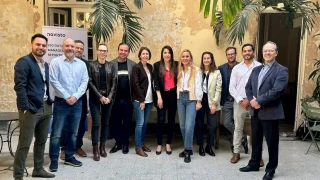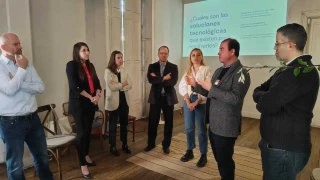
On December 13, 2024, Novisto hosted a Deep Dive Coffee session in Mexico City. The interactive workshop, co-facilitated with our partner Ticket for a Change México, brought together sustainability experts and practitioners to address the vital question:
How can technology accelerate sustainability?
The Deep Dive Coffee event is a cornerstone of Novisto’s global community-building, designed to foster collaboration and drive meaningful progress in sustainability. With a focus on peer-driven discussions, the workshop created a space where participants could engage openly, share lessons learned, and explore technological solutions to pressing sustainability challenges.

Identifying ESG reporting challenges: Key themes
In small groups, participants were prompted to reflect on the time-intensive nature of ESG tasks in addition to the expectations or external pressures they face regularly in their sustainability mandates.
Several key ‘issue areas’ or challenges were revealed through the discussion, including:
- ESG data collection: Participants emphasized the significant resources required for collecting ESG data and producing detailed sustainability reports. These tasks are labor-intensive and often detract from strategic initiatives that drive long-term value. Reducing the time spent on data collection and reporting was identified as a key need.
- Navigating and meeting stakeholder demands: Companies are increasingly navigating demands from stakeholders, including investors, customers, and regulatory bodies, to provide high-quality, transparent ESG disclosures. These expectations create a heavy workload and amplify the need for precision and timeliness in reporting.
- Measuring carbon emissions: Participants discussed the complexity of addressing carbon emissions across scope 1, 2, and 3. This challenge adds an additional layer of difficulty to reporting and requires robust data management systems and strategies to measure and reduce emissions effectively.
- A single source of truth ESG data: A lack of a central repository for ESG information complicates the process of collating disparate data and stakeholder inputs. Without a centralized and reliable source of data, teams struggle with accuracy, efficient reporting, and meeting evolving regulations.
- Preparing for external assurance: Preparing for compliance requirements or external audits is another significant challenge for sustainability teams. Ensuring readiness for these audits requires substantial effort and meticulous documentation.
Ultimately, these challenges point to the critical need for innovation and technology adoption to streamline processes and meet the growing demands of ESG initiatives.

Using technology to mitigate ESG reporting challenges
Building on the challenges identified, participants then turned their attention to exploring how technological solutions could address these issues. In small groups, they examined tools and platforms that simplify processes, enhance efficiency, improve traceability, and mitigate greenwashing risks.
Several specific tools and technologies were highlighted including:
- ESG data management and reporting platforms: These platforms centralize data collection and streamline the reporting process, reducing manual effort and improving data accuracy.
- Carbon accounting solutions: Tools that help organizations measure, track, and reduce their carbon footprints across scope 1, 2, and 3 emissions.
- Energy efficiency technologies: Technologies designed to monitor and optimize energy consumption, contributing to both cost savings and environmental goals.
- AI tools for analyzing data and benchmarking performance: Advanced analytics platforms powered by artificial intelligence provide actionable insights and enable companies to benchmark their sustainability performance against industry standards.
From roadblocks to action
The conversation moved from identifying challenges to exploring the tangible benefits of adopting ESG technology solutions, in addition to the risks of sticking with spreadsheets and manual processes.
- Value drivers of technology adoption:
- Cost reduction: Streamlined workflows and automation reduce operational costs.
- Time savings: Efficient tools free up teams to focus on strategic initiatives.
- Enhanced credibility: Accurate and transparent data builds trust with stakeholders.
- Business growth: Improved decision-making and compliance open opportunities for sustainable growth.
- Risks of inaction:
- Inefficiencies: Manual processes and fragmented data systems lead to wasted resources.
- Missed opportunities: Companies risk falling behind in optimizing resources and meeting stakeholder expectations.
- Reputational harm: Poor ESG practices can damage credibility, escalating to financial consequences.

Building momentum
The Deep Dive Coffee event underscored the value of fostering a trusted community where sustainability leaders can collaborate and exchange actionable strategies. This initiative represents Novisto’s commitment to advancing thought leadership and building a global community of practice in sustainability.
